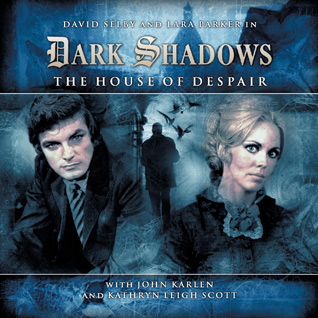|
A lone traveler is taking a train to Collinsport, and receives dire warnings from other passengers against getting off the
train there. With these echoes of the arrival of Victoria Winters begins the first of the Big Finish Dark Shadows audio dramas:
The House of Despair. (For an explanation of the difference between a book on tape and an audio drama, see "What is a Radio Play".)
The action of this drama picks up at some unnamed time in the future. This is apparently a good many years after we last saw
the Collins family; close enough in time that Quentin is known of, yet his unchanging appearance doesn't trigger comments.
A comment is made that the house has seen two hundred years of torment, which may or may not have been meant to place this
drama in the late 1990s.
Quentin, drawn to return to the town by feelings he can't explain -- even to himself -- finds a Collinsport much changed.
In a set up which will make the audience think of the 1995 storyline -- or The Fall of the House of Usher, its probable
inspiration -- Collinwood is abandoned and the family gone, having fled some unknown danger. The townspeople -- including
a Maggie Evans more like her cynical beginnings than the sweet governess of the later storylines -- are openly hostile to
Quentin and any mention of the Collins family. Apparently the only remote chance of any answers lies with finding a traumatized
and half mad Willie Loomis. When this avenue is less than successful, Quentin decides he has nothing to lose, and calls up
a very familiar and powerful spirit, gambling that she can be convinced to help them fight the entity that has claimed Collinwood
for its own.
Without going into more detail and spoiling the plot for those yet to hear it, this story was a good choice to lead off the
series. The tone and mood as well as the supernatural creature introduced are perfectly in synch with the television original.
Stuart Manning does an excellent job of balancing the tragedy, melodrama, irony and self-mocking humor that characterized
the original Dark Shadows. Even in hopeless situations there are injections of snarky gallows humor, and there are
in-joke references to things that happened on the original series. One good example of this was the disembodied voice that
ordered Quentin and Willie from Collinwood, declaring, "This house is MINE!", then backing up that statement with a supernatural
attack. To me this brought to mind the haunting of Quentin's ghost, who took ownership of the house in a similar fashion
before history was changed.
There are also extremely poignant scenes that give depth to the characters and bring forward the tragic side of their immortality.
I was particularly struck by the one between Angelique and Quentin, reminiscing (shades of Ashley Wilkes!) on the slow grace
of their original eras, now all gone to dust except for them, immortal anachronisms trapped in times not their own.
With Quentin, especially, this puts him in his proper time and place in the "real world" of his birth. Particularly evocative
of the late Victorian era is his quote about Europe, presumably on his Grand Tour as a young man "...oh, to relive that fleeting
beauty I saw through opium, absinthe...". I have seen some fans express shock and horror at this reference, but apparently
it's been forgotten that this was a rich, spoiled and hedonistic young man of the Gilded Age. Even in the original show,
he was implied to have practiced all the dissipations common to a young man of his wealth and social status. In the 1890's
even the most innocuous sounding patent medicines contained what are now controlled substances if not poisons, what are now
known as dangerous drugs were considered mildly scandalous indulgences, and the addictive qualities of many compounds would
not be discovered until after the First World War.
I found the characterizations of the original characters quite plausible. Some may quibble that they are not what they were
in the series, but then again, what INTERESTING and three dimensional characters wouldn't grow and change over a period of
so many years, and who knows what experiences?
The most extreme example of this will probably be Quentin; the rascal and self-centered reprobate now lecturing new character
Ed Griffin about taking care of his wife IF he really loves her. The coward who in 1897 ran, both physically and emotionally,
from the consequences of his actions is shown here as a man who seems to fear nothing. The feeling I get is that over time
since 1897 he had faced the worst that he felt could happen to him so all else paled in comparison. Then again, I have always
held that after the unending series of tragedies in 1897 played out, Quentin would have had a massive case of survivor guilt,
with all the psychological foibles that implies.
This in some ways gives Selby the most difficult balancing act within this cast, and he carries it off marvelously. He is
playing a character strongly remembered, but who is now over a hundred years of life experience away from the remembered rascal
of 1897. This is no longer the spoilt, bored, irresponsible and impetuous 28 year old man dragging trouble behind him like
a kite tail, but a sadder, more resigned man with a strong fatalistic streak. He knows that the light at the end of the tunnel
will always be another oncoming freight train, but he still allows himself to hope that, just this once, it won't be. Quentin
seems to have come to terms with who and what he is, and what he considers important -- yet the intense curiosity and pigheaded
stubbornness that got his younger self in so much trouble are still very much there. Selby's skilled voice work and the well-drawn
character on the pages combine to help us believe without question that this Quentin is a logical maturation of the one we
remember.
John Karlen dives into his role with great glee, giving us a Willie suffering guilt and remorse, but with the addition of
abject terror. This Willie doesn't resemble the one we last saw so much as he does the Willie who was first enslaved by Barnabas,
the one afraid of his own shadow and cringing at every move. Yet he somehow holds himself together enough to try and keep
things ready for the hoped for return of the family. And in an amusing note, Karlen gives Willie a strong southern accent,
which I don't recall his ever having on the series. (While in an interesting contrast Selby's natural WV accent is very muted
in this work.)
Angelique, as always, is inscrutable. Brought back against her wishes, she works her own agenda, which may or may not coincide
with the best interest of everyone else. Or, when it does, can result in a far different conclusion than anyone else expects.
Lara Parker slides right back into her role as if it was a pair of well broken in shoes. She picks up with Angelique and
runs with her as if no time has passed since she last played the role. She did the same, if I recall, in the earlier Return
to Collinwood and Vengeance at Collinwood.
Kathryn Leigh Scott's Maggie is not much more than a supporting character in this work, but she does a fine job. As mentioned
earlier, her Maggie has some bite (no pun intended!) again -- and A BACKBONE AGAIN! She is more than a bit cynical and suspicious,
but still cares what happens to Quentin and Willie.
The rest of the supporting cast is also quite good, especially the actor who played the new character "Strix" and the actor
who plays a familiar character who enters the action near the end of the work. The characters of Ed and Susan Griffin are
not in the action enough to really form an opinion of the work of Jamison Selby and Ursula Burton, but I understand that they
will be recurring characters, and may be featured more prominently in future installments.
In short, RUN do not WALK to buy this CD -- and subscribe to the series. This first installment is an excellent start. Based
on this and the quality of the Big Finish productions done for Dr. Who, subsequent Dark Shadows dramas should offer just as
good a value for money.
The disks can be ordered through the Big Finish website:
http://www.darkshadowsreborn.com
|

